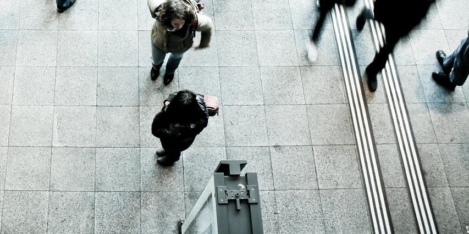To provide the best experiences, we use technologies like cookies to store and/or access device information. Consenting to these technologies will allow us to process data such as browsing behaviour or unique IDs on this site. Not consenting or withdrawing consent, may adversely affect certain features and functions.
The technical storage or access is strictly necessary for the legitimate purpose of enabling the use of a specific service explicitly requested by the subscriber or user, or for the sole purpose of carrying out the transmission of a communication over an electronic communications network.
The technical storage or access is necessary for the legitimate purpose of storing preferences that are not requested by the subscriber or user.
The technical storage or access that is used exclusively for statistical purposes.
The technical storage or access that is used exclusively for anonymous statistical purposes. Without a subpoena, voluntary compliance on the part of your Internet Service Provider, or additional records from a third party, information stored or retrieved for this purpose alone cannot usually be used to identify you.
The technical storage or access is required to create user profiles to send advertising, or to track the user on a website or across several websites for similar marketing purposes.
 The idea of a Global Village comes loaded with a number of idyllic connotations. Most of them derive from the use of the word village itself, which triggers the idea of a community in our minds. Yet even the man who coined and popularised the term in the 1950s and 60s to describe a world contracted by new media understood that there are always complications whenever technology rubs up against human beings. (more…)
The idea of a Global Village comes loaded with a number of idyllic connotations. Most of them derive from the use of the word village itself, which triggers the idea of a community in our minds. Yet even the man who coined and popularised the term in the 1950s and 60s to describe a world contracted by new media understood that there are always complications whenever technology rubs up against human beings. (more…)






 BlackRock is one of the largest asset management companies on the planet. Each year, at the start of January, the CEO Larry Fink writes a letter addressed to the other CEOs of the world. In his New Year’s letter for 2020, Fink appealed in particular to his fellow CEOs’ sense of social responsibility. In particular, he focused in on the risks faced by the climate. “Climate risk is an investment risk,” and he called on all companies, both public and private, to create greater societal added value. “Society is looking increasingly to companies to solve social and economic problems,” he concludes, so asset managers should be encouraged to invest in companies with a ‘purpose’.
BlackRock is one of the largest asset management companies on the planet. Each year, at the start of January, the CEO Larry Fink writes a letter addressed to the other CEOs of the world. In his New Year’s letter for 2020, Fink appealed in particular to his fellow CEOs’ sense of social responsibility. In particular, he focused in on the risks faced by the climate. “Climate risk is an investment risk,” and he called on all companies, both public and private, to create greater societal added value. “Society is looking increasingly to companies to solve social and economic problems,” he concludes, so asset managers should be encouraged to invest in companies with a ‘purpose’. 
 With the continuous impact of the pandemic on people’s mental health due to isolation, work uncertainty, and anxiety over health, the topic has been dominating the news, begging the question of how we can achieve accessible and cost-effective treatment for all and prevent the expected acceleration of mental health issues in the coming months. As we juggle a different type of work-life balance brought about by working from home and the added worry of how the pandemic is affecting us, there is no doubt that our daily lives have been disrupted. The statistics are alarming;
With the continuous impact of the pandemic on people’s mental health due to isolation, work uncertainty, and anxiety over health, the topic has been dominating the news, begging the question of how we can achieve accessible and cost-effective treatment for all and prevent the expected acceleration of mental health issues in the coming months. As we juggle a different type of work-life balance brought about by working from home and the added worry of how the pandemic is affecting us, there is no doubt that our daily lives have been disrupted. The statistics are alarming; 
 The World Economic Forum has launched a new report which sets out to define how organisational leaders can influence their companies and encourage the responsible use of technology and build ethical capacity.
The World Economic Forum has launched a new report which sets out to define how organisational leaders can influence their companies and encourage the responsible use of technology and build ethical capacity. 
 When we think about inclusivity and diversity in the corporate world, we often think of racial and cultural diversity, gender, or LGBTQ+ inclusion—but one aspect that has been too long forgotten or ignored is the topic of disability inclusion. Caroline Casey, disability activist, CEO and founder of the
When we think about inclusivity and diversity in the corporate world, we often think of racial and cultural diversity, gender, or LGBTQ+ inclusion—but one aspect that has been too long forgotten or ignored is the topic of disability inclusion. Caroline Casey, disability activist, CEO and founder of the 
 A December 2020 online study of 1,136 employed U.S. adults carried out by wellbeing provider
A December 2020 online study of 1,136 employed U.S. adults carried out by wellbeing provider 
 Productivity, morale and the ability to serve customers are being hamstrung by technology issues at European mid-size businesses, accordingly to research commissioned by
Productivity, morale and the ability to serve customers are being hamstrung by technology issues at European mid-size businesses, accordingly to research commissioned by 
 When it comes to job satisfaction, Denmark tops the list of the best places to work in digital in Europe – beating the UK, Germany and France – according to the 2020 Digital Talent Global Work Happiness Index. The Nordic country scored highly for work-life balance, family-friendly working models, purpose, personal safety and personal impact, which describes how much impact an individual feels they are making to their business.
When it comes to job satisfaction, Denmark tops the list of the best places to work in digital in Europe – beating the UK, Germany and France – according to the 2020 Digital Talent Global Work Happiness Index. The Nordic country scored highly for work-life balance, family-friendly working models, purpose, personal safety and personal impact, which describes how much impact an individual feels they are making to their business. 
 Freelancers actively promote entrepreneurship, claims research from
Freelancers actively promote entrepreneurship, claims research from 
 With many continuing to work remotely for the foreseeable future, new insights from
With many continuing to work remotely for the foreseeable future, new insights from 
 Almost half of UK businesses have seen an employee move on because their mental health wasn’t being looked after, with a quarter losing a key member of their workforce, according to new
Almost half of UK businesses have seen an employee move on because their mental health wasn’t being looked after, with a quarter losing a key member of their workforce, according to new 







January 11, 2021
Your organisation really needs to stop talking about a second pandemic
by Stephanie Fitzgerald • Comment, SF, Wellbeing